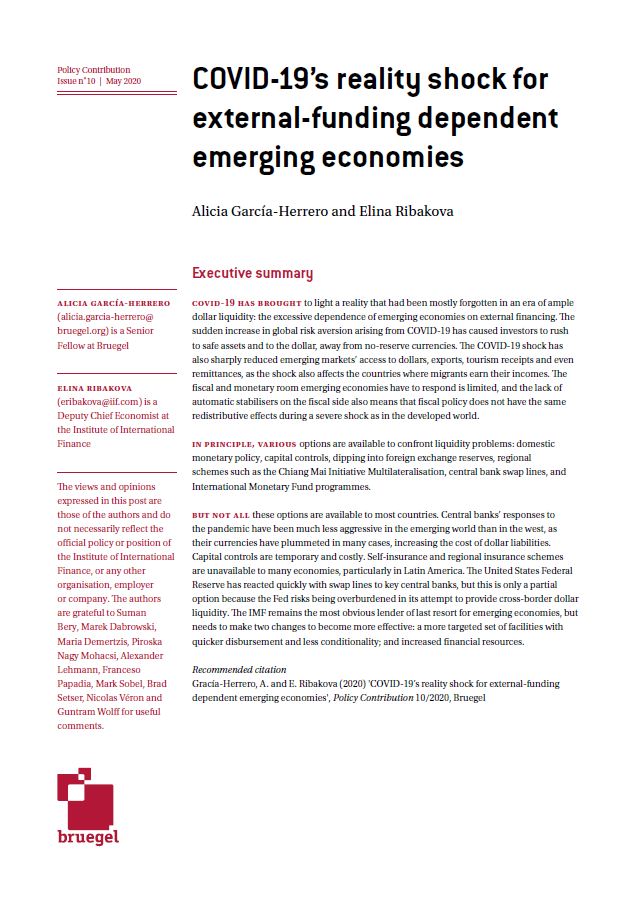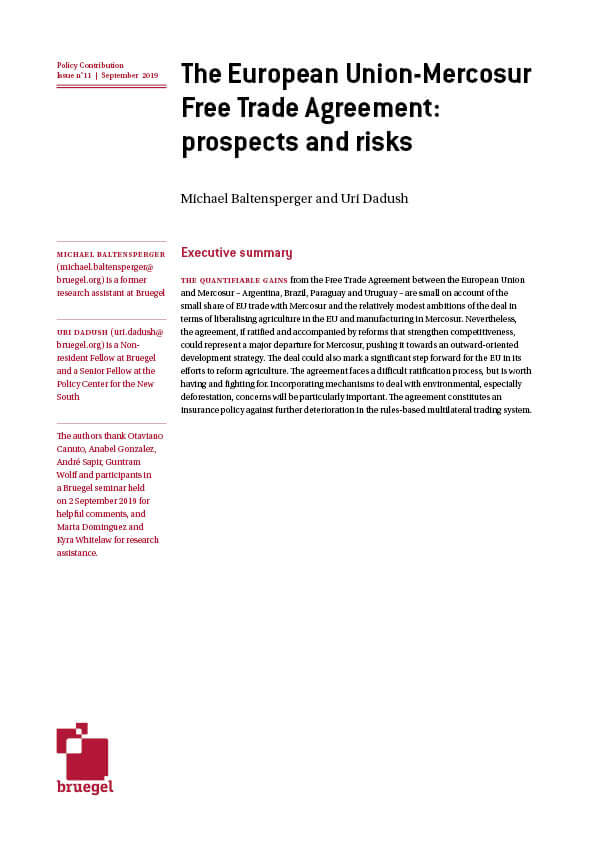Blog Post
Jair Bolsonaro’s Brazil
Far-right candidate Jair Bolsonaro won the Brazilian presidential elections after a highly polarising campaign. We review economists’ and scholars’ views of what this means for Brazil going forward.
Before the elections, Monica de Bolle wrote that the challenge for the winning candidate was going to be daunting: after suffering through the worst recession to ever hit Brazil, the economy has not quite recovered. Although growth has been restored, it has not been enough to create jobs for the more than 13 million unemployed Brazilian workers, and wages remain stagnant. Most importantly, Brazil has high and uncontrolled fiscal deficits and a debt-to-GDP ratio that is unsustainable over the medium term. Fiscal adjustment will be hard to orchestrate in an economy that is already weak – the short run effects through rising taxes and lower spending would further undermine growth.
Neither Bolsonaro nor Haddad had formulated clear economic plans. Bolsonaro endorsed pension reform, but did not give any indication of what his proposal would entail. His Social Liberal party (PSL) hardly has any congressional presence, making the task of governing through coalitions even more difficult. Markets appear to have become convinced that Bolsonaro would govern as a pro-market ultra-liberal because of his choice for finance minister, but – de Bolle argues – throughout his public life, Bolsonaro has always espoused nationalistic views, with a preference for state intervention. It is unlikely that his views have changed much, and hence his pick to run the economy may leave office sooner than most realise.
Guilherme Casarões focused on the implications of Brazilian elections for the future of the BRICS (Brazil, Russia, China and South Africa) group. In Brazil, the BRICS was seen as one of the pillars of President Luiz Inácio Lula da Silva’s ambitious foreign policy project. President Dilma Rousseff’s ousting came as a significant blow to the group. The Temer administration reinforced the country’s bid to join the Organization for Economic Cooperation and Development (OECD) which, for analysts and policymakers, was more than just a strategic decision – it was ultimately about Brazil’s international identity as belonging into the West, as a middle power competing with Argentina and Colombia for Washington’s loyalty and support.
In these elections, Casarões argues, the choice was still up for grabs. Bolsonaro’s foreign policy platform is anti-globalist: while not outspokenly protectionist, he suggests that Brazil must engage in the global cultural battle to restore the Judeo-Christian tradition by aligning with specific countries such as the United States, Israel, and Italy. He also openly criticised China as part of his anti-communist rhetoric. The election of Bolsonaro thus increases the chance of “Braxit” from the BRICS – either symbolically or officially.
Lupin Rahman at Pimco Blog wonders whether this is a “new dawn” for Brazil. The details on President-elect Bolsonaro’s macroeconomic policy plans remain to be seen, but his acceptance speech was constructive and business-friendly, emphasising the importance of private property and individual freedom. Brazil’s markets rallied for some time before the election, and responded positively to the second round results. But Bolsonaro faces important challenges that should give pause to investors. Brazil remains a highly polarised society and the 45% of votes cast for the opposition candidate mean that Bolsonaro will start with a higher rejection rate than previous presidents, and as a result, his honeymoon is likely to be short. Congress remains highly fragmented, and Bolsonaro’s lack of legislative track record is another area of uncertainty for investors and politicians alike, as his approach and position on key issues remain relatively unknown. For investors, Rahman argues, next to watch are the official announcements of the Cabinet, the minister of finance (widely expected to be the market-friendly economist Paulo Guedes) and the governor of the central bank, who is typically appointed by the incoming administration.
Isabelle Mateos y Lago writes on BlackRock Blog that Bolsonaro’s win heralds big changes for Brazil, whose economy remains in a fragile state despite recovering from the 2015-2016 recession. Brazilian risk assets had rallied since Bolsonaro’s polling prospects started improving ahead of the first round of the election. Further gains in Brazilian assets will hinge on the new government’s success in pressing ahead with economic reforms, particularly of Brazil’s bloated pension system. Bolsonaro was a politically divisive figure during much of the campaign, but his economic team appears committed to building on the reform agenda put in place over the past two years. Brazil’s longer-term prospects will depend on the new government’s progress in tackling Brazil’s debt dynamics, as the conclusion of the Brazilian election marks the end of a string of contentious Latin American political matches.
Harold Trinkunas at Brookings says that the election of Bolsonaro will likely prove a major break with Brazil’s traditional approach to foreign policy. In recent decades, Brazil has sought to influence the international order by relying heavily on “soft power”, an approach that reached its peak under Lula da Silva. Since 2014, however, Brazil’s soft power has steadily eroded, beginning with a major economic crisis, a massive corruption scandal and the impeachment of President Dilma Rousseff in 2016. The election of Bolsonaro will likely put paid to what remains of Brazil’s soft power abroad. First, the highly polarising vision of Brazil that President-elect Bolsonaro has set forward is unlikely to appeal to many abroad, nor will it provide new reasons for diplomatic partners to align with Brazil. Second, his attack on Brazil’s traditional diplomatic policies reflects a lack of support for the present international order, one that for all its flaws, Brazil has relied on to extend its influence and protect its interests. And finally, his desire to align with President Trump’s foreign policy means betting all of Brazil’s chips on a US president and a Washington foreign policy establishment that has traditionally cared little for Brazil.
The Economist writes that the combination of political authoritarianism and free-market economics heralded by Bolsonaro is not new in Brazil or Latin America. Positivism – which was little more than a footnote in Europe – was hugely influential in Latin America, especially in Brazil and Mexico. It combined a preference for strong central government with a conception of society as a hierarchical collective, rather than an agglomeration of free individuals. Positivism hijacked liberalism and its belief that progress would come from political and economic freedom for individuals, just when this seemed to have become the triumphant political philosophy in the region in the third quarter of the 19th century. The divorce between the ideas of political and economic freedom in Latin America was in part a consequence of the region’s difficulty in creating prosperous market economies and stable democracies based on equality of opportunity. But it has also been one of the causes of that failure.
Liberalism never died in Latin America, but in the 20th century it often lost out. With industrialisation and the influence of European fascism, positivism morphed into corporatism, in which economic freedom yielded to the state’s organisation of the economy, as well as society, in non-competing functional units. The exception to military corporatism was General Augusto Pinochet’s personal dictatorship in Chile from 1973 to 1990. Bolsonaro is a fan of Pinochet, and so is Guedes. So is Brazil in for a dose of “pinochetismo”? Under Bolsonaro’s presidency, Brazil could hope for a reformed, faster-growing economy and a president who keeps his authoritarian impulses in check. But there are plenty of risks. Perhaps the biggest one is of illiberal democracy in which elections continue, but not the practice of democratic government with its checks and balances and rules of fairness.
Republishing and referencing
Bruegel considers itself a public good and takes no institutional standpoint. Anyone is free to republish and/or quote this post without prior consent. Please provide a full reference, clearly stating Bruegel and the relevant author as the source, and include a prominent hyperlink to the original post.






